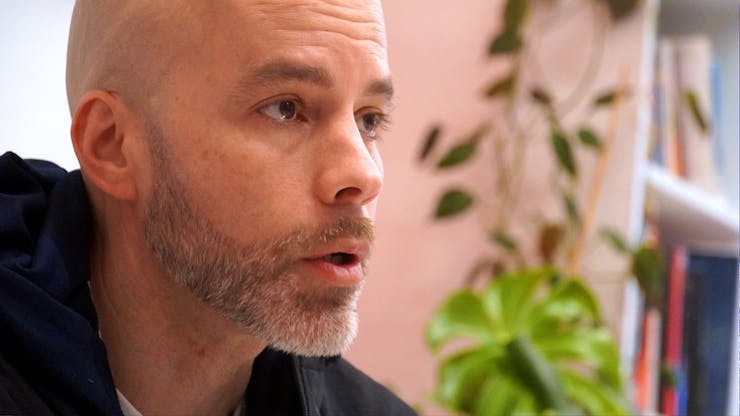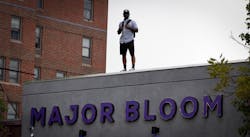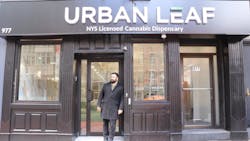Alex Norman followed his instincts, and the lyrics of New York rap legends, to find success in various fields. In 28 grams of game, Leafly breaks down his legacy-to-legal cannabis journey for those hoping to take a similar path.
You might not know the name Alex Norman, yet. But if you’ve smoked weed in New York over the past decade or two, you’re probably more familiar with the Budega NYC owner’s product than than you think. His Brooklyn high school includes famous alumni like Chris Rock, Chuck Schumer, and Bernie Sanders. And Norman’s name could soon be on that list, thanks to his incredible legacy-to-legal cannabis journey.
Over the years, Norman has thrived in many non-cannabis ventures, including as a financial advisor and radio station jefe. While running PNC Radio (People Need Change!), a trailblazing online station that produced landmark podcasts like The Combat Jack Show, Norman also ran cannabis deliveries on the side. He remained undetected by all of his associates thanks to a strict code he developed while running the high-end, lowkey service.
Now that weed is legal, Norman is poised to step out of the shadows and take his talents to the licensed market. He’s currently an applicant for one of New York’s first dispensary licenses, which are exclusive to business owners with New York cannabis convictions, like him. But the state can’t award any licenses in Brooklyn, where Norman applied, until a federal judge settles a messy lawsuit.

With day one of legal sales around the corner, and the lawsuit delaying his plans for a legal dispensary indefinitely, Leafly caught up with Norman in Bed-Stuy as he weighed a handful of options. Wait for a legal license? Pivot to branding or consumption lounges?
Here’s how one of New York’s underground pioneers is approaching The Hempire State’s budding billion-dollar legal market.
1. “Keep one eye open like CBS”
Alex Norman was born in Miami in the 70s, and grew up in Manhattan, Queens, and Brooklyn during New York’s historically harsh Drug War. Through the power of observation, Norman gathered that weed was a big deal from a young age. His dad used the plant, and he first tried it himself in middle school. But it wasn’t until college at Rutgers that Norman started selling. Despite the risks, he couldn’t ignore the steady, lucrative side money.
Today, Norman says his success in the legacy cannabis field was due to his attention to detail. When it was illegal, he weighed every move against the consequences of prison. Today, he channels that focus into the legal industry—always checking the pulse of the city and its weed culture, looking to stay ahead of both the law and the competition.
2. “The weed game reminds me of the rap game”

Growing up in 1980s NYC and working in radio through the 2000s also gave Norman a special view of Hip Hop’s growth from local “trend” to America’s most streamed genre. He sees parallels in the future of legal weed, which has experienced a similarly-jarring-180 from public nuisance to beloved cash crop before his eyes.
Rappers like Redman and Nas normalized the plant in his youth. While others like JAY-Z spoke to the larger contradictions Norman also noticed within the Drug War. Norman said he gravitated to JAY’s depictions of the rarely told toll that dealing can take on the dealer.
“Couldn’t talk about it if you ain’t live it,” Norman said, when asked what music scored his late night runs and self reflections over the years. “Your word was everything, so everything you said you’d do, you did it,” he remembers JAY rapping in 1997. Those and other lyrics made him feel seen, even while he hid in plain sight as a dealer.
3. “That marketing plan was me”
Norman’s first two careers gave him knowledge that can now be leveraged well in New York’s weed industry. He studied political science at Rutgers University and worked in finance at Merrill Lynch before creating the People Need Change! online radio station, and later running marketing for various companies. His experience navigating the worlds of finance, media production, and marketing—all while covertly running a legacy operation—now make for a rare resume in NY’s cannabis scene.
“I worked in finance for nine years. I know how to calculate my cash flows and manage inventory, which translates to: ‘I know what customers like, what they don’t like, what works, what doesn’t work.’”
Alex Norman, Budega NYC
4. “The strong move quiet, the weak start riots”
When it comes to the weed game, if your bud’s loud, there’s no need to raise your voice. Norman takes that advice to heart, drawing listeners in with a soft but sharp tone that rarely approaches max volumes. He explained that his longevity has come from keeping his voice low and his head down. He’s also stayed close to the plant, and the people buying it, while avoiding flashy antics and questionable business practices that led to law enforcement then, and regulatory enforcement now.
5. “Trigger your roots”
As a Cuban American, Norman says some relatives admonished him for smoking, while others embraced it. “Within the Latin American community, I was just fortunate that my parents were very young and fully engaged. It’s a slow battle, but it’s never gonna go back to what it was 20 years ago,” he said.
While Norman’s dad embraced cannabis and often smoked it around him growing up, his mother didn’t touch it. “For me, it wasn’t something looked down upon, but also the message was like, you can’t do that as a child. As a teenager, you have [to have] your shit together. Then cannabis is good for you.”
The War on Drugs didn’t help the mixed feelings about weed. Negative propaganda and racist policing let stereotypes about weed’s effects and the people who grow and sell it fester nationwide. Many minority communities are still unpacking the stigma, weighing the fear of criminalization with the desire to use freely.
6. “Watch what you say”
The mechanics of Norman’s legacy delivery service required strict discretion. There were no advertisements, only word of mouth. Still, Norman and other delivery kingpins found ways to keep a steady flow of clientele supremely satisfied. New York, after all, smokes more weed than any city on earth.
Buyers had to follow strict rules meant to protect Norman and his runners. Cash only, vague code phrases, and the constant reminder to “watch what you say” on the phone were necessary barriers to buying. Those that stayed inbounds enjoyed consistent selections and professional service. If Norman could navigate that clouded customer experience, he believes selling legally should be a breeze.
7. “Time is money”
Norman said punctuality was a huge selling point for his delivery business. “Even 10, 15 years ago, the competition amongst delivery services was real,” remembers Norman. “If you weren’t on time, your customers always had a second or third option,” just a New York minute away.
8. “Thank your connections”
Norman’s early foray into the weed business came from friends and neighborhood connections that were crafted over a lifetime. As a professional, he says members of his radio station staff have risen to huge careers in entertainment. He’s proud to contribute to their success, and eternally grateful for the dedicated network that continues to push him forward, always looking for new ways to collaborate on win-wins.

9. “Less is more”
Despite his reach and reputation, Norman’s direct team is small. Even when he ran a fleet of drivers that spanned the city, he’d add himself to the schedule to avoid bringing too many loose ends into the operation. The small circle approach worked, as one of Norman’s radio or corporate partners surely would have blown his cover at some point—intentionally, or by accident.
10. “Trees can grow in Brooklyn”
Norman can admit it—his first attempts at indoor growing were boof. But those early stints helped him network and figure out where he wanted to take his business. “Probably 80% of the conversations that I have with people about cannabis are about growing,” he said. “There are so many variables that you have no control over.”
11. “It’s never what you do, but how it’s done”
While running his radio station, Norman still found time to keep a few indoor lights growing. Learning the grow side of the game helped him better understand and appreciate the plant, which he showed the same love and care he gave to customers. From seed to sale, many operators simply follow the script without putting time and attention into each step. Norman rejects that approach.
“Retail’s always going to make that number,” Norman said of lazy cultivators. He insists the same proof of work shows in a grower’s crops as a business’ customers. That’s why he’s aiming Budega NYC for artistic excellence above machine-like efficiency.
12. “Know your rights”
With the plant still illegal on a federal level, and in many states, knowing the law is crucial to the success and survival of any cannabis entrepreneur. At the end of the day, even the most legitimate companies are breaking the same federal laws that Norman once did. Except his compliance chops were sharpened by Rudy Giuliani’s drug task force vans and Mike Bloomberg’s stop-and-frisk checkpoints, which helped New York arrest more people for weed than any city in the world.
As a result, Norman has no illusions about New York City’s capacity for crackdowns. That’s why he says anyone still operating an illicit store in the state’s gray market is clearly not from the same legacy cannabis community that he comes from. “They can shut shit down,” Norman said weeks before the state raided 53 stores to take 100,000 products and $4 million in cash.
13. “Relax and take notes”
While the smoke clears from the lawsuit that’s blocking his license, Norman is sitting back and observing. He’s taking note of the case and its implications on the industry, but he’s not attached to a particular outcome.
14. “Pivot”
Norman said his lawyer advised it could take 3 months or more for the court to give New York permission to grant the held licenses. That’s why, he said, “I’ve already kind of shifted to plan B and I just have to wait and see how things pan out. I can’t sit here and f***ing mope about it and complain and be negative.”
While Norman checks all the boxes for a CAURD license applicant, he doesn’t feel entitled to one. If he doesn’t win a license, he said he could just as easily go into branding and manufacturing given his background and Budega’s broad appeal. He also uses social media and the Budega website to publish educational content about the cannabis industry, and to sell merch.
“I have the brand positioned in a way that allows me to pivot,” Norman said. So if things don’t work out in court, he may just work with a processor to start licensing the Budega NYC brand into other stores.
15. “Just dream about the get-back”

Faced with minor legal setbacks like this court case or his past cannabis charge, Norman doesn’t dwell. He just looks for an angle to bounce back from. So while there was no way to foresee the current reality of legal weed back when he was selling, he never lost faith in a better future. Now it’s all paying off.
“I started my brand three years ago in anticipation of an opportunity like this,” Norman told Leafly. The brand is also positioned to be a high-end consumption lounge when the law allows for those to go into business.
16. “Imagine the impossible”
In 1998, Nas described a new world order of smoking weed in the streets without cops harassing. At the time, Norman was living a very different reality, one which is still common for many Americans. “They took the briefcase in the middle of the street and slammed it on the ground,” Norman remembers of the run in that got him a cannabis conviction.
“They just popped open jars all over the street, bags, the whole nine. Literally left our shit in the middle of the street.”
Alex Norman, Budega NYC
Today, Norman still wonders if the state will truly forgive him and those who lived just like him pre-legalization. He said the first test will be how New York regulates illicit stores without handcuffs or criminalization. The Mayor and other officials have promised that seizures and summons will be the maximum penalty for unlicensed cannabis sellers. Norman and other New Yorkers are watching closely to see if the state keeps its word.
17. “Spread love (it’s the Brooklyn way)”

Now that every bodega has bud behind the counter, it can be tough to build a loyal base while still making margins. Norman says in his delivery service’s early days, when he was the one taking calls and dropping orders off, he’d spend as much time as he could between orders just chatting with customers. He learned about their lives and tastes, not just how deep their pockets went. That created a bond that led to repeat business.
18. “Treat your business like you treat your lady”
“Happy wife, happy life, right? Norman explained: “Give her that attention and give her the time that she wants. It’s the same thing with your customers. Build that trust early on when you’re building your clientele.”
19. “Reintroduce yourself”
The name Budega evokes both weed and a beloved staple of New York City living. Convenient, versatile, and of the community, bodegas are the perfect inspiration for Norman’s new vision. His marketing background helped him cultivate the brand identity, more proof that he will never stick to one lane. Branching into multiple fields brought a range of degrees and certifications that give him the flexibility to approach the cannabis business from multiple angles.
20. “Represent”

On a rainy walk through Bed-Stuy, Norman’s distinctive voice echoed between the hollow Brownstone-lined streets. For decades before, vibrant barbershops and stoops housed sacred debates: Purple Haze or Sour Diesel? Biggie, JAY-Z or Nas? Today, rain, COVID-19, and gentrification have all emptied the lively streets Norman once served faithfully. But Budega and legalization now offer a new lease on New York’s dynamic backdrop.
Both the plant and the city excel at bringing communities and cultures together into a melting pot. Pot is the new cauldron at the heart of Gotham’s world-famous blend. With Drug War soldiers and survivors like Norman, Harlem’s Branson, and GUMBO’s Luka Brazi wearing the chef’s aprons, New York’s next decade promises to be deliciously dank.
21. “Remember back in the days”
The last four Leafly Strain of the Year winners trend towards the Cookies family of sweet dessert strains, and New York has eaten them up according to our data. But Norman is more intrigued by his personal roster of classic strains, like Haze, Northern Lights, Jack Herer, and Blueberry. With the help of Leafly’s strain database and news coverage, Norman has curated a palate for quality over hype. Though he’s always sure to keep multiple options for customers with info on how the terpenes and cannabinoids will impact them.
22. “Fall back, not off”
“After I got arrested for it, I had to fall back,” Norman says. “I was on probation, even though I was still running my delivery service. But growing is what got me to sell my delivery service, and then commit my time, full time to PNC radio and running my radio station.”
23. “Make short term goals, based on your long term goals”
Coming from a financial background, Norman knows that all that glitters is not gold, or green. The realities of starting and sustaining a cannabis business, especially seeing what can happen in other states, means his perspectives are set for years to come. “I have to be aware of what I’m getting myself into, and try to stay in front of it,” Norman said.
24. “Let your product speak for itself”
In the cannabis world, Norman compares growers to gamblers and rockstars—flexing their wins while hiding their losses. The competition is stiff, and you never know how someone might leverage perceived weakness. After all, Norman says, “your end product is what people judge you by.”
25. “Don’t knock the hustle”
Norman laughs at the fact one of his favorite rappers is now a potential competitor. He loves JAY-Z enough to tease that he was never a big time smoker, at least compared to his rap peers. But as a hustler himself, Norman can’t knock JAY’s ambition to make big green with legal weed through MonoGram, The Parent Company and other legal cannabis ventures.
26. “Bet on yourself”
Faced with the immeasurable odds of the Drug War, Norman bet on himself and is coming out on top. He refused to be limited by the ceilings he grew bored crashing into in the corporate world. And while he doesn’t endorse or glorify breaking the law, he certainly feels vindicated by legalization and normalization.
27. “Manifest it”
Can Norman live the NYC stoner’s dream through Budega? If you ask him, he’s close to that reality with or without a licensed business. Through Budega, he plans to manifest the dream in tangible goals—whether a consumption lounge, a branding and licensing deal, or a CAURD license. Whatever comes, his vision isn’t defined by those small details, but rather financial and creative freedom.
28. “The world is yours”
If you’re like Alex Norman, and looking to transition from legacy operator to participant in the legal cannabis industry, remember one last thing: The weed world is yours. So have fun. And don’t lose the passion for the plant that brought you here in the first place.
Whether you’re a budtender, delivery driver, cultivator, or business owner—take the same time and care you’d want growers to take with your bud. While others seek to grow vertically, be sure to build horizontally—with the people right next to you—while sharing ideas, and celebrating wins.
Norman’s Budega story is proof that cultivating real bonds and staying true to your roots will pay off in due time. And in the meantime, life’s short. So puff some La, and keep your head in the game. You never know when your shot will come.
Visit Budega NYC on Instagram for updates on the brand’s moves in 2023.





